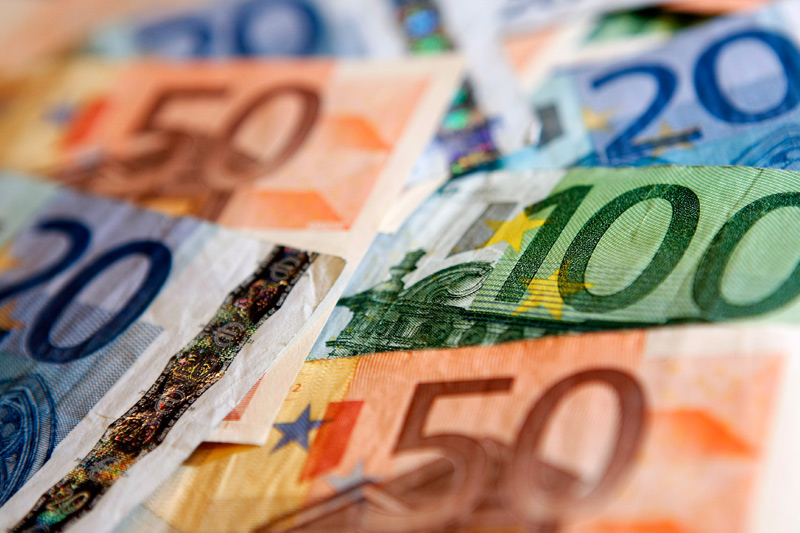Investing.com - The euro was broadly higher against the other major currencies on Thursday, after better-than-expected euro zone manufacturing data, but gains were limited as investors awaited more details of the European Central Bank’s bond buying program.
During European late morning trade, the euro was trading close to a seven-week high against the U.S. dollar, with EUR/USD rising 0.26% to 1.2560.
A report earlier showed that manufacturing activity in the euro zone improved in August, but remained in contraction territory for the 12th consecutive month, while service sector activity slumped to a two-month low.
The euro zone’s manufacturing purchasing managers’ index rose to a seasonally adjusted 45.3 in August from a final reading of 44.0 in July, compared to expectations for a reading of 44.2.
The services PMI ticked down to 47.5 from 47.9 in July. Analysts had expected the index to dip to 47.7.
Manufacturing activity in Germany improved for the first time since January this month, but remained in contraction territory for the sixth consecutive month.
The data came after a report showing that manufacturing activity in China slumped to a nine-month low in August, adding to concerns over a slowdown in the world’s second largest economy.
Investors were continuing to eye a series of meeting in the euro zone, after German Chancellor Angela Merkel said Wednesday that no decision on extending Greece’s economic reform program would be taken this week.
The dollar remained under broad selling pressure after Wednesday’s minutes of the Federal Reserve’s August meeting showed that many policymakers think additional easing may be warranted "fairly soon" unless there is evidence of a "substantial and sustainable" strengthening in the economic recovery.
The single currency was higher against the pound, with EUR/GBP up 0.28% to 0.7911.
The euro was trading close to a six-week against the yen, with EUR/JPY climbing 0.28% to 98.73 and remained little changed against the Swiss franc, with EUR/CHF dipping 0.01% to 1.2009.
The shared currency was broadly higher against the Australian, Canadian and New Zealand dollars, with EUR/AUD rising 0.38% to 1.1970, EUR/CAD gaining 0.17% to trade at 1.2441 and EUR/NZD slipping 0.09% to 1.5374.
Later Thursday, the U.S. was to release its weekly government report on initial jobless claims, followed by preliminary data on manufacturing activity and official data on new home sales.
During European late morning trade, the euro was trading close to a seven-week high against the U.S. dollar, with EUR/USD rising 0.26% to 1.2560.
A report earlier showed that manufacturing activity in the euro zone improved in August, but remained in contraction territory for the 12th consecutive month, while service sector activity slumped to a two-month low.
The euro zone’s manufacturing purchasing managers’ index rose to a seasonally adjusted 45.3 in August from a final reading of 44.0 in July, compared to expectations for a reading of 44.2.
The services PMI ticked down to 47.5 from 47.9 in July. Analysts had expected the index to dip to 47.7.
Manufacturing activity in Germany improved for the first time since January this month, but remained in contraction territory for the sixth consecutive month.
The data came after a report showing that manufacturing activity in China slumped to a nine-month low in August, adding to concerns over a slowdown in the world’s second largest economy.
Investors were continuing to eye a series of meeting in the euro zone, after German Chancellor Angela Merkel said Wednesday that no decision on extending Greece’s economic reform program would be taken this week.
The dollar remained under broad selling pressure after Wednesday’s minutes of the Federal Reserve’s August meeting showed that many policymakers think additional easing may be warranted "fairly soon" unless there is evidence of a "substantial and sustainable" strengthening in the economic recovery.
The single currency was higher against the pound, with EUR/GBP up 0.28% to 0.7911.
The euro was trading close to a six-week against the yen, with EUR/JPY climbing 0.28% to 98.73 and remained little changed against the Swiss franc, with EUR/CHF dipping 0.01% to 1.2009.
The shared currency was broadly higher against the Australian, Canadian and New Zealand dollars, with EUR/AUD rising 0.38% to 1.1970, EUR/CAD gaining 0.17% to trade at 1.2441 and EUR/NZD slipping 0.09% to 1.5374.
Later Thursday, the U.S. was to release its weekly government report on initial jobless claims, followed by preliminary data on manufacturing activity and official data on new home sales.
